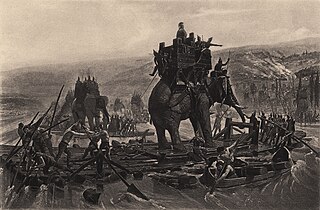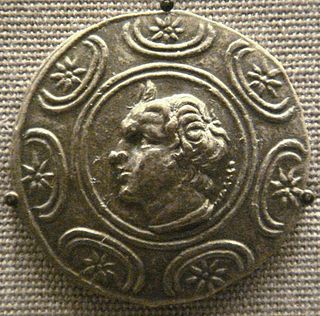Related Research Articles
The 4th century BCE started the first day of 400 BCE and ended the last day of 301 BCE. It is considered part of the Classical era, epoch, or historical period.

The 3rd century BC started the first day of 300 BC and ended the last day of 201 BC. It is considered part of the Classical Era, epoch, or historical period.
This article concerns the period 229 BC – 220 BC.
Year 241 BC was a year of the pre-Julian Roman calendar. At the time it was known as the Year of the Consulship of Atticus and Cerco. The denomination 241 BC for this year has been used since the early medieval period, when the Anno Domini calendar era became the prevalent method in Europe for naming years.
This article concerns the period 319 BC – 310 BC.

This article concerns the period 309 BC – 300 BC.
During the 290s BC, Hellenistic civilization begins its emergence throughout the successor states of the former Argead Macedonian Empire of Alexander the Great, resulting in the diffusion of Greek culture throughout the Levant and advances in science, mathematics, philosophy, etc. Meanwhile, the Roman Republic is embroiled in war against the Samnites, the Mauryan Empire continues to thrive in Ancient India, and the Kingdom of Qin in Ancient China, the one which in the future will conquer its adversaries and unite China, begins to emerge as a significant power during the Warring States period.
This article concerns the period 289 BC – 280 BC.
This article concerns the period 279 BC – 270 BC.
This article concerns the period 249 BC – 240 BC.
Year 246 BC was a year of the pre-Julian Roman calendar. At the time it was known as the Year of the Consulship of Crassus and Licinus. The denomination 246 BC for this year has been used since the early medieval period, when the Anno Domini calendar era became the prevalent method in Europe for naming years.
Year 239 BC was a year of the pre-Julian Roman calendar. At the time it was known as the Year of the Consulship of Turrinus and Falto. The denomination 239 BC for this year has been used since the early medieval period, when the Anno Domini calendar era became the prevalent method in Europe for naming years.
Year 243 BC was a year of the pre-Julian Roman calendar. At the time it was known as the Year of the Consulship of Fundulus and Galus. The denomination 243 BC for this year has been used since the early medieval period, when the Anno Domini calendar era became the prevalent method in Europe for naming years.
Year 244 BC was a year of the pre-Julian Roman calendar. At the time it was known as the Year of the Consulship of Atticus and Blaesus. The denomination 244 BC for this year has been used since the early medieval period, when the Anno Domini calendar era became the prevalent method in Europe for naming years.
Year 320 BC was a year of the pre-Julian Roman calendar. At the time, it was known as the Year of the Consulship of Cursor and Philo. The denomination 320 BC for this year has been used since the early medieval period, when the Anno Domini calendar era became the prevalent method in Europe for naming years.
Year 310 BC was a year of the pre-Julian Roman calendar. At the time, it was known as the Year of the Consulship of Rullianus and Censorinus. The denomination 310 BC for this year has been used since the early medieval period, when the Anno Domini calendar era became the prevalent method in Europe for naming years.
Year 280 BC was a year of the pre-Julian Roman calendar. At the time it was known as the Year of the Consulship of Laevinus and Coruncanius. The denomination 280 BC for this year has been used since the early medieval period, when the Anno Domini calendar era became the prevalent method in Europe for naming years.
Year 314 BC was a year of the pre-Julian Roman calendar. At the time, it was known as the Year of the Consulship of Libo and Longus. The denomination 314 BC for this year has been used since the early medieval period, when the Anno Domini calendar era became the prevalent method in Europe for naming years.
Year 281 BC was a year of the pre-Julian Roman calendar. At the time it was known as the Year of the Consulship of Barbula and Philippus. The denomination 281 BC for this year has been used since the early medieval period, when the Anno Domini calendar era became the prevalent method in Europe for naming years.

Antigonus II Gonatas was a Macedonian Greek ruler who solidified the position of the Antigonid dynasty in Macedon after a long period defined by anarchy and chaos and acquired fame for his victory over the Gauls who had invaded the Balkans.